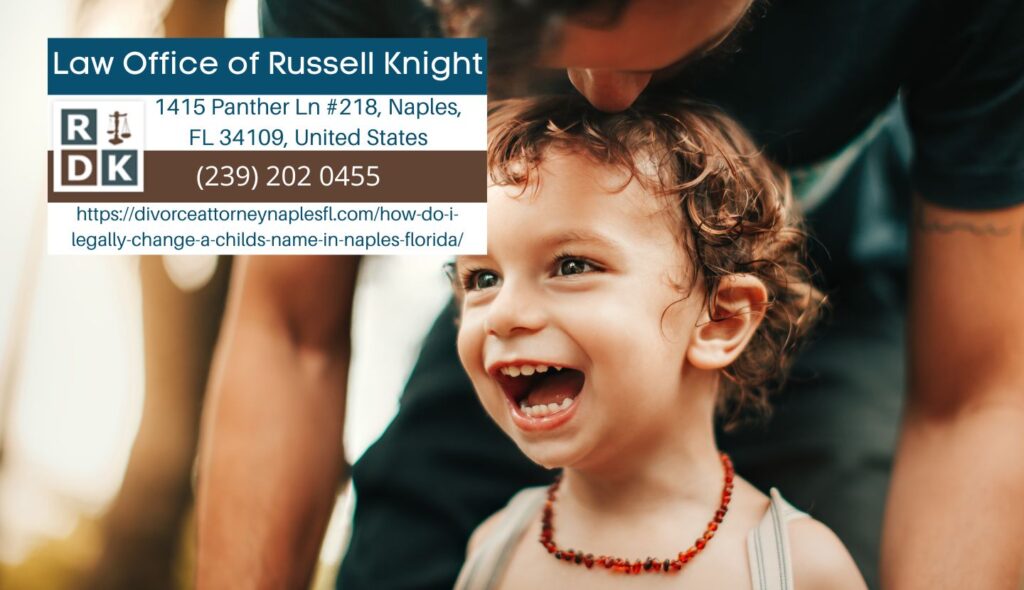In most states, the birth certificated is just a formality with no legal control. In Florida, the birth certificate is a big deal. Listing the father on the birth certificates can make that man the legal father automatically, (but this can be undone by court order). Fla. Stat. Sec 382.013(2).
Likewise, whoever puts the child’s name on the birth certificate gets to name the child. If the mother and father are married to each other they will typically agree. If the husband and wife fail to agree, the last name of the child will be a hyphenated version of each name they both selected in alphabetical order. Fla. Stat. Sec. 382.013(3)(b). For example, If Amber Allen and Bruce Battenburg have a child together and can’t settle on the child’s name, the child’s last name will be Allen-Battenburg.
If the parents are not married, the mother has the right to name the child for both first and last names. Usually this isn’t a problem, except in the very common occurrence of the mother giving the child her last name and not the father’s last name. The child carrying the father’s last name is not automatic. Girten v. Andreu, 608 So. 2d 886 (Fla. 3d DCA 1997)
The father can’t even ask that the child’s name be something different until he has established paternity with the court. Once a father, has established paternity, the father can then petition the court to change the child’s last name to the father’s last name.
Paternity typically gets established in the county where the child lives. If your child lives in Naples, Florida, you can go to the Collier County courthouse to establish paternity.

If the father wants to change the child’s last name, the father must show that it is in the best interests of the child that the child’s carry his last name. V.S. v. B.M., 281 So. 2d 587 (Fla. 2d DCA 1973). In my experience, the judge will often push the parties to agree to a hyphenated name and, failing that, the judge will give the child the father’s name purely because of the cultural tradition. This, of course, depends on the judge and the judge’s opinion of how important a last name is. If the child knows their last name (this usually happens between ages 2 and 3) then the judge will often not allow for the change of a last name.
If for some reason (usually spite) a party asks to change a child’s last name during a divorce proceeding, the courts will almost always deny that request. Airsman vs. Airsman, 179 So. 3d 342, 345 (Fla .2d DCA 2015).
If parents together decide to change their child’s name (first or last), they don’t do so through the family law courts but rather through the chancery courts pursuant to Florida statute section 68.08(7) “A husband and wife and minor children may join in one petition for change of name and the petition must show the facts required of a petitioner as to the husband and wife and the names of the minor children may be changed at the discretion of the court.”
If only one person wants to change the child’s name they follow Florida statute section 68.08(8), “When only one parent petitions for a change of name of a minor child, process shall be served on the other parent and proof of such service shall be filed in the cause; however, if the other parent is a nonresident, constructive notice of the petition may be given pursuant to chapter 49, and proof of publication shall be filed in the cause without the necessity of recordation.” This means the other parent has to be formally served notice if they live in Florida. If the other parent does not live in Florida and presumably cannot be found, you can publish the notice in the newspaper.
The two ways to change a child’s name in Chapter 86 of the Florida statutes seem very simple compared to what I wrote earlier in this article. Unfortunately, you cannot use this chapter if there’s an ongoing divorce or a paternity case. “This section does not apply to any change of name in proceedings for dissolution of marriage” Fla. Stat. Sec. 68.07(9).
Contact my family law office in Naples, Florida to speak with a Florida divorce lawyer to learn if changing your child’s name is viable.
| Topics | Details |
|---|---|
| Birth Certificate Role | In Florida, birth certificates hold legal significance; listing father can establish legal paternity and child’s name. |
| Naming Convention for Married Parents | If married parents agree, child’s name is usually settled; if not, hyphenated version of each parent’s name in alphabetical order. |
| Naming Rights for Unmarried Mothers | Unmarried mothers have right to name child; father’s last name not automatic, requires paternity establishment to change. |
| Changing Child’s Last Name | Father can petition to change child’s last name after establishing paternity; court considers child’s best interests. |
| Paternity Establishment | Paternity typically established in county where child resides, such as Collier County for Naples, FL. |
| Court’s Consideration of Name Change | Court weighs best interests and cultural tradition; child’s age and familiarity with last name impact decision. |
| Changing Name During Divorce | Requesting name change during divorce is often denied by courts. |
source https://divorceattorneynaplesfl.com/how-do-i-legally-change-a-childs-name-in-naples-florida/
No comments:
Post a Comment